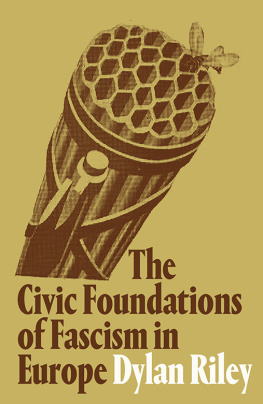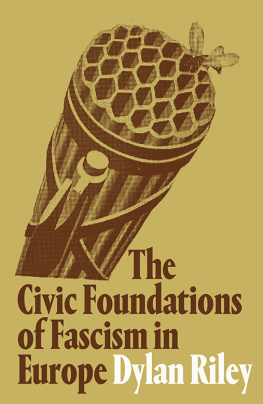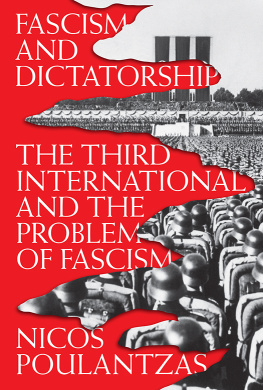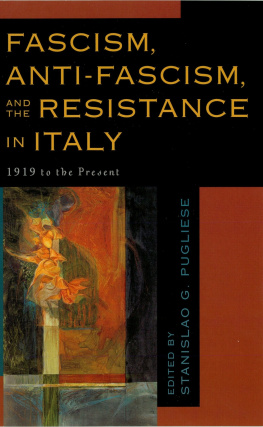Dylan Riley - The Civic Foundations of Fascism in Europe: Italy, Spain, and Romania, 1870-1945
Here you can read online Dylan Riley - The Civic Foundations of Fascism in Europe: Italy, Spain, and Romania, 1870-1945 full text of the book (entire story) in english for free. Download pdf and epub, get meaning, cover and reviews about this ebook. year: 2010, publisher: Johns Hopkins University Press, genre: Politics. Description of the work, (preface) as well as reviews are available. Best literature library LitArk.com created for fans of good reading and offers a wide selection of genres:
Romance novel
Science fiction
Adventure
Detective
Science
History
Home and family
Prose
Art
Politics
Computer
Non-fiction
Religion
Business
Children
Humor
Choose a favorite category and find really read worthwhile books. Enjoy immersion in the world of imagination, feel the emotions of the characters or learn something new for yourself, make an fascinating discovery.
- Book:The Civic Foundations of Fascism in Europe: Italy, Spain, and Romania, 1870-1945
- Author:
- Publisher:Johns Hopkins University Press
- Genre:
- Year:2010
- Rating:5 / 5
- Favourites:Add to favourites
- Your mark:
The Civic Foundations of Fascism in Europe: Italy, Spain, and Romania, 1870-1945: summary, description and annotation
We offer to read an annotation, description, summary or preface (depends on what the author of the book "The Civic Foundations of Fascism in Europe: Italy, Spain, and Romania, 1870-1945" wrote himself). If you haven't found the necessary information about the book — write in the comments, we will try to find it.
From the late nineteenth century to World War I, voluntary associations exploded across Europe, especially among rural non-elites. But the development of this civil society did not produce liberal democracy in Italy, Spain, and Romania. Instead, Riley finds that it undermined the nascent liberal regimes in these countries and was a central cause of the rise of fascism. Developing an original synthesis of Gramsci and Tocqueville, Riley explains this surprising outcome by arguing that the development of political organizations in the three nations failed to keep pace with the proliferation of voluntary associations, leading to a crisis of political representation to which fascism developed as a response. His argument shows how different forms of fascism in Italy, Spain, and Romania arose in response to the divergent paths taken by civil society development in each nation.
Presenting the seemingly paradoxical argument that the rapid development of civil society facilitated the rise of fascism in Italy, Spain, and Romania, Riley credibly challenges the notion that a strong civil society necessarily leads to the development of liberal democracy. Scholars and students interested in debates about the rise of fascism and authoritarianism, democratization, civil society, and comparative and historical methods will find his arguments compelling and his conclusions challenging.
Dylan Riley: author's other books
Who wrote The Civic Foundations of Fascism in Europe: Italy, Spain, and Romania, 1870-1945? Find out the surname, the name of the author of the book and a list of all author's works by series.












